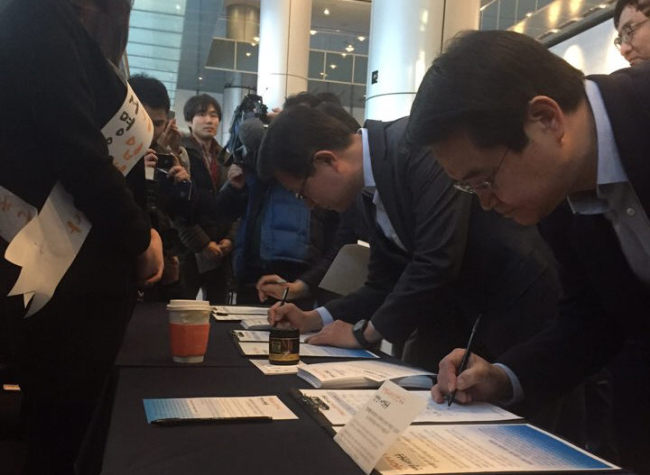With a debate roiling over President Park Geun-hye’s participation in a petition for the prompt legislation of economic bills, Korean conglomerates are stepping up efforts to turn the campaign into a nationwide business movement.
Samsung Group became the first private business to join the campaign, with other big conglomerates, such as Hyundai Motor Co. and LG Group, reportedly mulling whether to follow suit, industry sources said Wednesday. A booth was opened at Samsung’s Seocho office for executives to sign.
Samsung Group became the first private business to join the campaign, with other big conglomerates, such as Hyundai Motor Co. and LG Group, reportedly mulling whether to follow suit, industry sources said Wednesday. A booth was opened at Samsung’s Seocho office for executives to sign.

Park on Monday signed the petition initiated by the Korea Chamber of Commerce and Industry to urge the lawmakers to pass contentious labor bills on Monday. Cheong Wa Dae on Wednesday said it was Park’s decision to join the movement. According to the KCCI, some 40,000 citizens had signed on as of Tuesday.
Park’s signing effectively raised public awareness as well as criticism from opposition camps, which have claimed the president abused her power in favor of the interests of businesses, while shunning the use of presidential authority to reach a consensus with a legislative body.
The government had been at loggerheads with the labor unions and the opposition over its economic measures including labor reform plans. The government contends the easing of labor regulations would boost the sluggish economy and add jobs for young workers. But the labor unions and opposition parties view them as expanding temporary jobs and making it easier for employers to dismiss workers.
“I can’t help but think of state-led demonstrations during the Syngman Rhee and Park Chung-hee administrations,” said main opposition The Minjoo Party of Korea leader Rep. Moon Jae-in, referring to their mobilization of their supporters to promote their policies and suppress opposition movement.
An opposition lawmaker accused the president of violating the democratic rule of separation of powers by infringing upon the legislative body’s authority. Rep. Han Jeoung-ae of the Minjoo Party called her move “extremely worrisome” on such concerns.
Some experts noted that Park’s decision to join the petition may not be ideal, but could have been one of few options she saw open to her.
“It is fair to say the National Assembly is not doing its job. But it does not look good for the president to take to the street, either. Instead of directly appealing to the people, she should have communicated first with lawmakers,” said Choi Jin, chairman of the Institute of Presidential Leadership.
“Though it is hard to say that she violated the rule of separation of powers, she should have done better. She should have approached the lawmakers and persuaded them first before going down the street and appealing to the people,” said politics professor Yoon Sung-yi of Kyung Hee University.
Other pundits cited the petition case as an example that can question Park’s leadership.
Yoon Pyeong-joong, political philosophy professor of Hanshin University, noted that the president does not appear to fulfill her obligation as a leader who should communicate with opposing groups.
“Admittedly, it is a minor incident. But I think it reflects that the president’s unwillingness to perform her duty. Given the fact that she had never held a one-on-one session with an opposition leader, the petition could serve as yet another example that she does not take her job seriously,” Yoon said.
By Yeo Jun-suk (jasonyeo@heraldcorp.com)







![[From the Scene] Monks, Buddhists hail return of remains of Buddhas](http://res.heraldm.com/phpwas/restmb_idxmake.php?idx=644&simg=/content/image/2024/04/19/20240419050617_0.jpg&u=20240419175937)







![[From the Scene] Monks, Buddhists hail return of remains of Buddhas](http://res.heraldm.com/phpwas/restmb_idxmake.php?idx=652&simg=/content/image/2024/04/19/20240419050617_0.jpg&u=20240419175937)

![[KH Explains] Hyundai's full hybrid edge to pay off amid slow transition to pure EVs](http://res.heraldm.com/phpwas/restmb_idxmake.php?idx=652&simg=/content/image/2024/04/18/20240418050645_0.jpg&u=20240419100350)

![[Today’s K-pop] Illit drops debut single remix](http://res.heraldm.com/phpwas/restmb_idxmake.php?idx=642&simg=/content/image/2024/04/19/20240419050612_0.jpg&u=)